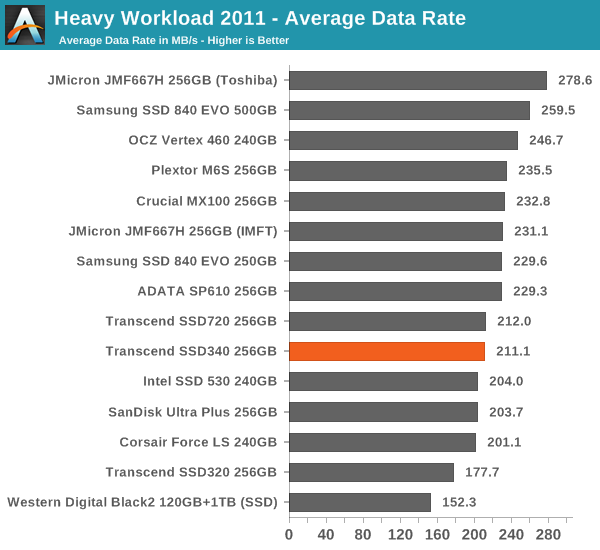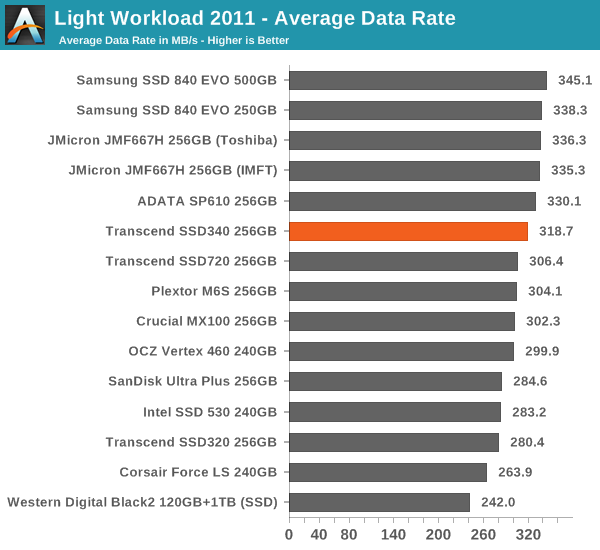Transcend SSD340 (256GB) Review
by Kristian Vättö on August 4, 2014 5:00 AM ESTAnandTech Storage Bench 2011
Back in 2011 (which seems like so long ago now!), we introduced our AnandTech Storage Bench, a suite of benchmarks that took traces of real OS/application usage and played them back in a repeatable manner. The MOASB, officially called AnandTech Storage Bench 2011 – Heavy Workload, mainly focuses on peak IO performance and basic garbage collection routines. There is a lot of downloading and application installing that happens during the course of this test. Our thinking was that it's during application installs, file copies, downloading and multitasking with all of this that you can really notice performance differences between drives. The full description of the Heavy test can be found here, while the Light workload details are here.

Fortunately the performance is much better in our 2011 Storage Benches. It looks like the JMF667H does fairly well in terms of peak performance but as soon as you fill the drive and start playing with consistency, the performance will take a massive hit.











57 Comments
View All Comments
ddriver - Monday, August 4, 2014 - link
I didn't say "value".Impulses - Monday, August 4, 2014 - link
Besides, $30 32GB SD cards actually hit 45-60MB/s sequential.. Think I saw a $65 64GB PNY rated at 90/60 R/W, doesn't get any more value priced than that, unless you meant bargain bin SD cards...hojnikb - Tuesday, August 5, 2014 - link
Yeah, but sd card like that would be pretty unsuitable for running OS.Impulses - Tuesday, August 5, 2014 - link
Obviously, their random access speed sucks, he and I were just drawing a parallel to other cheap devices with sequential speeds that aren't very far off... Shoot, I've paid <$50 for 32-64GB USB 3.0 flash drives that hit 200MB/s sequential read/writes. I think any enthusiast knows sequential speed isn't ultimately why you buy a SSD (most of the time), but still...willis936 - Monday, August 4, 2014 - link
I'm pretty sure SSDs from 2009 are faster than this.hojnikb - Monday, August 4, 2014 - link
they are not.ddriver - Monday, August 4, 2014 - link
2-3 years ago was 2011-2012 :) I have a Samsung 830 128 GB which IRC came out around that time, and it is actually faster, reaching like 380 MB/sec in sequential reads.ddriver - Monday, August 4, 2014 - link
*writesCome on AT, what is this - the stone age? You know, the time people wrote on stone tablets and editing was pretty much impossible? How about an "edit" feature?
jabber - Monday, August 4, 2014 - link
I have to say as long as they push 150MBps+ with 0.XX access times most cases are covered.All in the access times for day to day usage, not so much the raw MBps.
hojnikb - Monday, August 4, 2014 - link
its not all about access times.You can have a bad ssd with great access times and it will still feel slow as HDD if writes are utter garbage (you can test this by installing OS on a cheap usb drive).